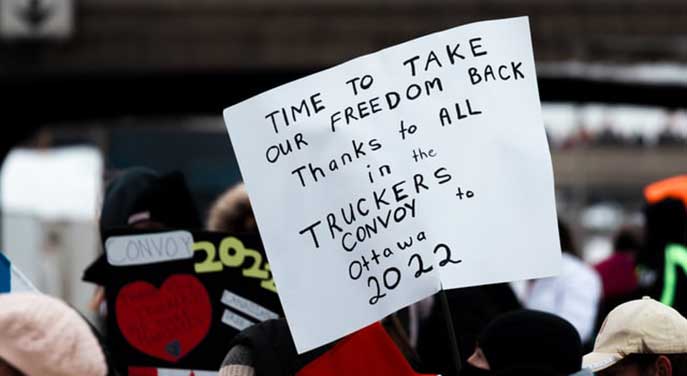 A vast gulf exists between Canada’s chattering classes – many politicians, some journalists and a plethora of academics – and citizens on multiple issues, including most recently the self-described Freedom Convoy.
A vast gulf exists between Canada’s chattering classes – many politicians, some journalists and a plethora of academics – and citizens on multiple issues, including most recently the self-described Freedom Convoy.
It has much to do with the lack of the feedback mechanisms found in other countries: direct democracy, otherwise known as referendums, on laws and the ability to recall a politician.
One can sympathize with the truckers’ frustrations over the COVID-19 lockdowns over the last two years without endorsing every action or sentiment that emanated from them. Convoy protesters had no more right to tie up commerce at borders and demand Prime Minister Justin Trudeau resign as a condition of ending their blockades than do anti-oil-and-gas activists have a right to shut down pipeline construction and dictate environmental and energy policy via bullhorns.
(Trudeau’s use of the Emergencies Act and freezing bank accounts is his own vast overreach.)
| RELATED CONTENT |
| Should those who mismanaged Covid crisis be held legally accountable? By Preston Manning |
| The allegations for invoking the Emergencies Act were baseless By Ryan Alford |
| The horror! U.S. pandemic response far better than Canada’s By Shawn Whatley |
Canada lacks the more practical ability to channel frustrations from citizens to governments. Elections aren’t sufficient for policy feedback because they’re rarely about policy. Also, the federal government and most provinces have practically outlawed non-politician and non-political-party voices during elections with restrictions on what such third parties can spend, which is a fraction of political parties. That shuts down an opportunity for citizens to be heard.
Workable referendums and recall capacity in Canada would serve two purposes:
- as a relief valve for frustrated citizens no matter their ideology or cause;
- the chance to actually affect government policy on occasion.
Consider two direct democracy examples:
Last summer, San Franciscans decided they’d had enough with three woke schoolboard trustees and started a recall campaign. Citizens were frustrated that 50,000 children were kept out of school for 18 months during COVID. But what really touched off the recall campaign was the trustees’ notion that San Francisco schools were hotbeds of “systemic racism” – that accompanied a proposal to rename schools in the district named after George Washington, Thomas Jefferson, Abraham Lincoln and even Democratic Sen. Diane Feinstein.
The recall vote last week resulted in 70 per cent of voters – in liberal San Francisco – opting to recall the trustees.
That’s one example of an obvious direct feedback loop to politicians, between elections and where extreme policy positions can be challenged and defeated along with the politicians who propose them.
Another example of useful direct democracy comes from Switzerland. Last June, Swiss voters rejected a government plan to impose a carbon tax, though the vote was close: just shy of 52 per cent rejected the tax.
As well, voters in Nebraska voted in 1990 to raise taxes; a 1994 referendum in Oregon made that state the first to legalize assisted suicide; and Californians voted in 2016 to ban plastic bags.
Then there are the multiple referendums over the years on marijuana. For example, legalization was first placed on the ballot in 1972 in California, when two-thirds of voters said no. The motion was approved in 2016. Voters in dozens of other states have also voted on marijuana/cannabis-related ballot initiatives over the past three decades, and 20 states plan referendums on cannabis-related issues this year alone.
And 26 American states have referendum legislation allowing for direct public input on multiple issues from taxes to the death penalty.
Referendums create a vital incentive: Citizens have a reason to think more deeply about policy and laws precisely because their vote can directly impact government policy. Absent that, why would most people take the time to study a tax proposal?
Such back-and-forth between citizens and governments is rare in Canada. Alberta passed recall and referendum legislation but it awaits proclamation. British Columbia passed referendum and recall legislation in 1996 after most voters endorsed the two concepts in the 1991 election. One MLA, Paul Reitsma, was almost recalled in 1999 when 25,000 voters signed a petition to start an official recall election after Reitsma wrote phoney letters to a newspaper praising himself under fake names. Reitsma resigned before a recall election could be held.
Proof that direct democracy is a useful educative tool was also evident the last time a federal referendum occurred, in 1992, when Canadians voted on the Charlottetown accord (a set of proposed amendments to the Constitution). The referendum was advisory. A majority of voters in a majority of provinces voted it down.
What was almost more important than the outcome was the process: I remember debating with friends whether the distinct society for Quebec clause was a good idea. Plenty of people with little interest in policy, politics or constitutional matters also read up and discussed such matters.
I share the Freedom Convoy’s general preference for freedom but disagree on some specifics. But I’m never surprised when activists and protesters of any stripe feel frustrated because they all lack a practical way to be heard and to impact government policy.
Referendums are no guarantee that good ideas will be converted into public policy and poor ones will be left orphaned. The reverse could happen just as easily. But that’s just as true of politicians and the policies they enact.
Properly designed, referendums are of benefit because they allow for actual citizen votes on matters that enough Canadians care about. Win or lose, they promote a two-way dialogue on policy instead of one-way lectures from the chattering classes to truckers and everyone else.
Mark Milke is president of The Aristotle Foundation for Public Policy, a new think-tank set for launch later this year. His most recent book is The Victim Cult: How the culture of blame hurts everyone and wrecks civilizations.
Mark is a Troy Media Thought Leader. For interview requests, click here.
The opinions expressed by our columnists and contributors are theirs alone and do not inherently or expressly reflect the views of our publication.
© Troy Media
Troy Media is an editorial content provider to media outlets and its own hosted community news outlets across Canada.

